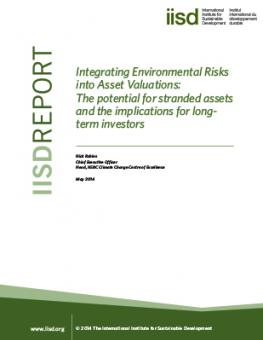
Integrating Environmental Risks into Asset Valuations: The potential for stranded assets and the implications for long-term investors
Institutional investors are increasingly committed to integrating environmental, social and governance (ESG) factors into their strategies for delivering risk-adjusted returns and delivering their ownership responsibilities.
Institutions with between USD$20 trillion and US$87 trillion in assets under management have made commitments to varying levels of integration, ranging from requests for improved corporate disclosure to incorporating ESG factors into valuations to changing asset allocation.
The shift to a low-carbon economy is likely to be disruptive for market valuations. Long-term carbon targets have not traditionally been included in market valuations, creating an overinvestment in fossil fuels. These could become stranded assets as policy, market, technology and social conditions change. HSBC and other financial institutions have started to analyze the valuation implications of the low-carbon transition, highlighting that 40 to 60 per cent of current European coal, oil and gas valuations are at risk from the low-carbon transition.
Reforms in investor practice and market frameworks are needed to prevent value destruction. Investors need to take action to anticipate these shifts, diverting capital from high-risk areas ahead of time. In addition, a series of policy and regulatory steps can be taken to enable financial markets to operate with greater foresight through long-term environmental challenges.
Additional downloads
You might also be interested in
Toward a Coherent, Transformative Approach to Financing Sustainable Development, Climate, and Nature
Four key proposals for the Fourth Financing for Development Conference (FfD4) to create an integrated, equitable approach to financing climate, nature, and development goals.
FfD4: How the Fourth Financing for Development Conference can strengthen finance for development, climate, and nature
As FfD4 approaches, Alexandra Readhead explores key issues and how the conference can reshape global financing for SDGs, climate, and biodiversity.
Why the Energy Charter Treaty Modernization Doesn't Deliver for Climate
The Energy Charter Conference adopted the "modernized" Energy Charter Treaty (ECT) on December 3, 2024. IISD's Lukas Schaugg explains what the modernization does, when it will enter into force, its tension with EU law, and why the reformed ECT can still hinder climate policies.
The Responsible Agricultural Investment Tool for Agribusiness and Case Studies
This report summarizes a collaboration to support agribusinesses in complying with principles of responsible investment in agriculture and food systems.